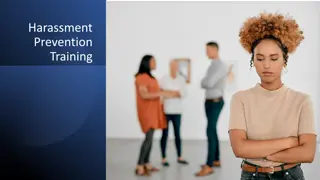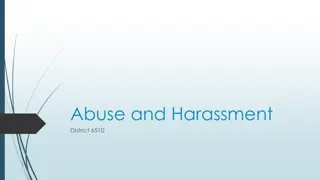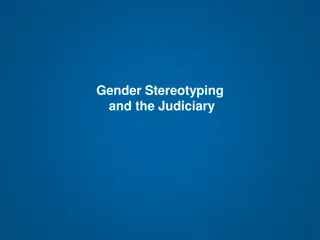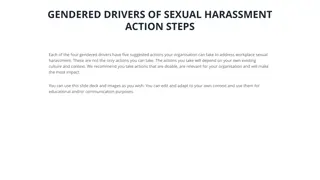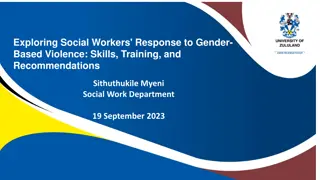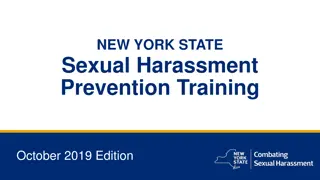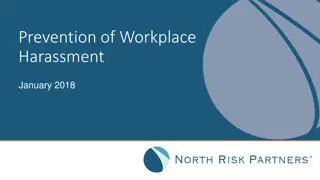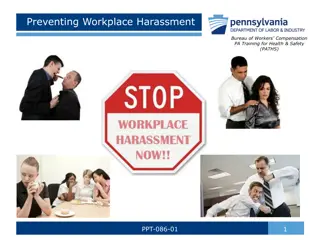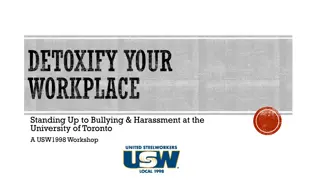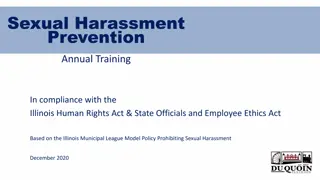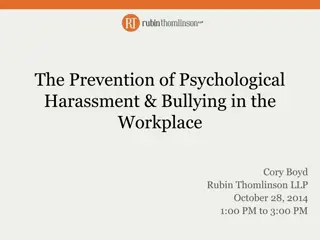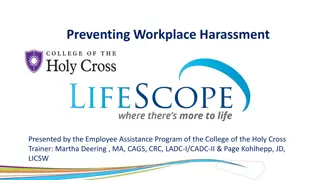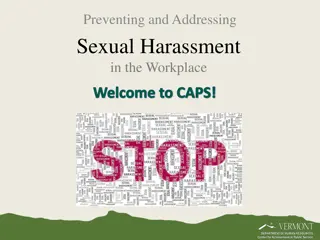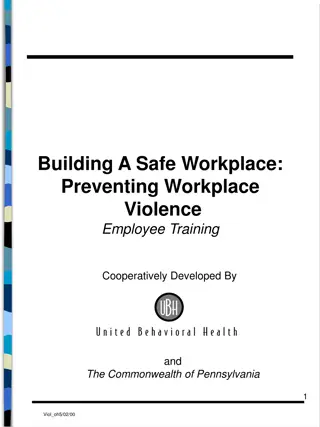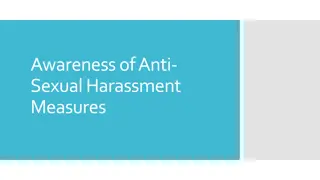Stories of Gender-Based Violence and Harassment in the Workplace
Stories shared by women facing gender-based violence and harassment at their workplaces - from domestic workers in Hong Kong to factory employees in Nicaragua and a young woman from Gabon - shedding light on the challenges they endure, from sexual harassment to psychological abuse.
Download Presentation

Please find below an Image/Link to download the presentation.
The content on the website is provided AS IS for your information and personal use only. It may not be sold, licensed, or shared on other websites without obtaining consent from the author.If you encounter any issues during the download, it is possible that the publisher has removed the file from their server.
You are allowed to download the files provided on this website for personal or commercial use, subject to the condition that they are used lawfully. All files are the property of their respective owners.
The content on the website is provided AS IS for your information and personal use only. It may not be sold, licensed, or shared on other websites without obtaining consent from the author.
E N D
Presentation Transcript
Stop the gender based violence and harassment at the workplace
TESTIMONIES I am Jemma, 28 years old, Filipina, working as domestic worker in Hong kong. I left my family in Philippines to help my husband in supporting our children in their needs. In my first contract I ve got a Chinese couple employer. In my three months of working with them is not easy because I don t have my own room and normally just staying in the living room. I am not comfortable in this kind of situation especially most of the time the husband was coming home early than his wife from work. A few months later, I experienced sexual harassment from my male employer and because of my fear, I did break my contract with them and ask for the help of my agency for me to go back in the Philippines. The agency didn t help me and I find my own way to look for another employer with the help of my friends.
My name is Mary, 29 year old. Im currently employed at the Hansae export-processing zone in Nicaragua. Every day, when I commute from home to work, I am subjected to sexual harassment in the street. Society sees this practice as normal and harmless, though it is a form of gender-based violence, and I really feel I m harassed when walking in public. In the export-processing zone, violence, as we experience it, comes from male operators doing the same job as us, or by superiors who exert their power and machismo over us. I work under constant pressure from 7 am to 4 pm, sometimes until 9 in the evening. My superior always tells me that he ll fire me if I don t work faster. I drink very little water so as not to have to go to the bathroom. When I can t stand it any longer, my supervisor counts the seconds that I spend in the bathroom. Sometimes i find myself in situations at my workplace where I suffer psychological assaults, including very strong language, shouts and insults. My superior also shouts things in my face such as you are stupid, an animal, a waste, inefficient, ignorant , and they blame us for mistakes and losses in production My supervisor takes advantage when I m busy working and touches my buttocks and my back, and he sometimes asks for sex in exchange for keeping my job. Many of us do not accept this despite the pressure, but some young single mothers have given in to the harassment out of fear and because of the lack of guarantees offered by the system to those who report violence.
THIS IS THE STORY OF A YOUNG WOMAN FROM GABON, SHE SAID AND I QUOTE: My boss became impatient and very aggressive verbally. He didn't want to see me with my co-workers. He always wanted me to be alone in one of the rooms of his company where he had to be the only one to access it to steal a kiss from me. It was getting very difficult for me. I didn't say anything because I had no choice, I needed the job. He threatened to fire me every day because I kept resisting him. Eventually he fired me because of not meeting his expectations. I came home crying. So I found myself unemployed
SUSAN, 19 years I am a student at a high school in the eleventh grade, I work next to the school as a caretaker for a handicapped man and also go daily to a company to clean. Before this I ve worked as a waitress in a restaurant. One day, i was asked to serve a beer to my boss and his cook. I went into the kitchen and gave the two men the beers. "You, Susan, do you prefer it from the front or the back?" Sounded the voice of my boss. I didn't realize his words and even when he asked me again I had no idea how to react. "Can't be that hard. It's a simple question, or don't you know, since you've never tried it? The cook's words only made me feel more unwell. Still perplexed, I stood before those two men as I apologized and left. As I walked, I heard them laughing and inventing things that weren't true. Back at my place at the bar, I concentrated on my actual work again. My boss sent me home shortly afterwards. The next day I had a bad feeling, I didn't want to go back to the restaurant but I was dependent on the job. With a pounding heart and fear, I stood behind the counter when I was called into the kitchen.
"You know, Susan I was wondering if you wouldn't like to blow the cook. I would leave you two alone for this," was the first thing my boss said to me that day. Like the day before, I had no idea of a suitable reaction. What do you mean? How should one prepare for such an action? When I stood in the kitchen door and didn't answer anything, my boss told me that he had thought I was more self-confident, that he couldn't use shy waitresses, that something like me shouldn't work in the catering trade. He went on like this the following days. He treated all females like this. Me and a colleague who is 17 years, went to the police to denounce it. The officer said as long as there was no concrete way of touching us the denounce did not have any chance. I finally quit the job.
In these testimonies like many other cases, young workers are unorganized due to contractualization and labor flexibilization. Their situation does not permit them to organize or have poor access to labour rights such as freedom of association, collective bargaining, non-discrimination and access to justice which often resulted to harassment, arbitrary arrests, physical assault and false accusation of criminal charges. There will be no social dialogue without freedom of association. The testimonies also represent many other women, men and LGBT, who suffer gender based violence at work. It is a challenge which is not enough discussed so far in social dialogue procedures. We think that this phenomena cannot be separated from gender based discrimination at the work-place in general, not from the unequal representation of genders in the social dialogue processes.
These realities with their negative impact and results are undoubtedly gender-based discrimination, violence and harassment on the global workers especially the young women and they undermine the principles on just work for all, rejecting the values of equality and equity and of genuine social justice and dignity at life and at work. If we reflect this realities from the perspective of our faith, the scriptures bare our heart and soul to the reality that god has made humankind into his image and likeness (genesis 1, 26) woman and man..And all living creatures he created them and having called them into being and having endowed them with his image, he entrusts to them the world he has made and all that is in it.. (Genesis 1:28). Hence, the IYCW international plan of action emphasizes: through gender equality and equity campaign, we want to end discrimination, violence and harassment in any form, including in workplaces. We want to promote justice, equal participation and opportunities for men and women.


